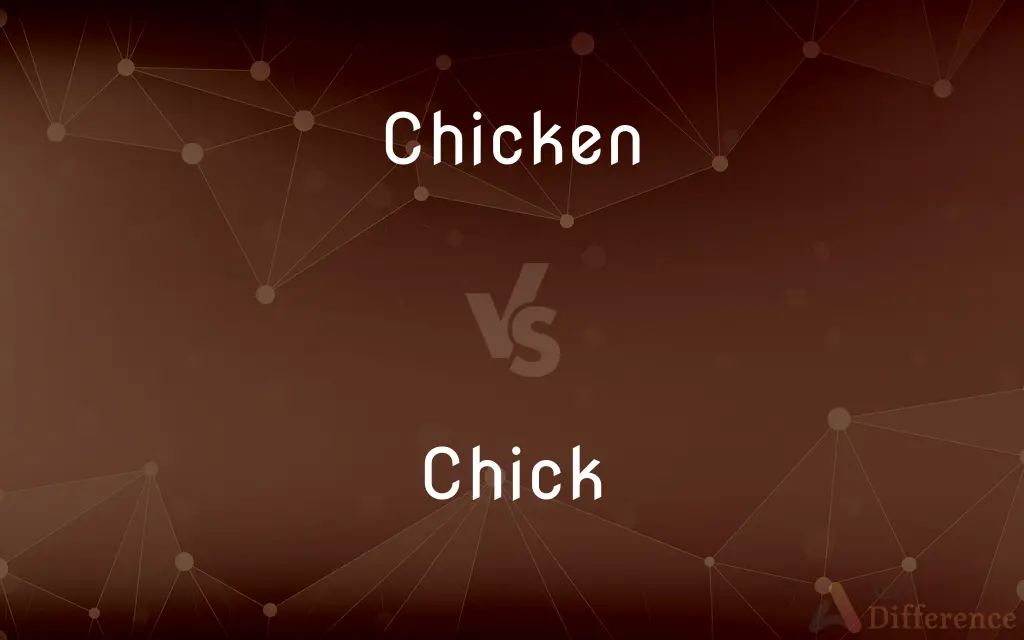Chicken vs. Chick — What's the Difference?
By Urooj Arif & Fiza Rafique — Updated on March 17, 2024
Chicken is a mature bird used for meat or eggs; a chick is a young chicken, often newly hatched.

Difference Between Chicken and Chick
Table of Contents
ADVERTISEMENT
Key Differences
A chicken refers to both the male and female of the species Gallus gallus domesticus, a domesticated fowl widely kept for its meat or eggs. Chickens are categorized based on their purpose: those raised for meat are known as broilers, while those kept for laying eggs are called layers. On the other hand, a chick is specifically a young chicken, typically from hatch until it is several weeks old, before it develops feathers. Chicks are characterized by their soft, downy feathers and are dependent on their mother or a heat source for warmth.
Chickens play a significant role in human agriculture, providing two main products: meat and eggs. They are one of the most common and widespread domestic animals. Whereas chicks represent the early life stage of the chicken, requiring careful management to ensure their growth into healthy chickens, whether for egg production or meat.
The diet of chickens varies as they grow; big chickens eat a wide range of food, including grains, seeds, insects, and even small animals. Chicks, however, are often fed a starter feed that is high in protein to support their rapid growth and development. This dietary difference is crucial for their respective health and productivity.
In terms of care, chickens are relatively low-maintenance once they reach certain age, needing basic shelter, food, and water to thrive. Chicks, however, require more intensive care, including a controlled environment that maintains an appropriate temperature to ensure their survival and health during the vulnerable early weeks of life.
The terminology used to describe chickens also differs by age and purpose; for instance, pullets are young female chickens that have not yet begun to lay eggs, and cockerels are young male chickens. This distinction fades as they mature, at which point they are simply referred to as chickens. Chicks, therefore, are the starting point in the lifecycle of a chicken, marking the beginning of the journey from dependence to productive member of the poultry community.
ADVERTISEMENT
Comparison Chart
Definition
A mature domestic fowl kept for egg production or meat.
A young chicken, especially newly hatched to several weeks old.
Purpose
Raised for meat (broilers) or eggs (layers).
Raised to grow into chickens for meat or egg production.
Diet
Varied, including grains, seeds, insects, and small animals.
Starter feed high in protein to support rapid growth.
Care Requirements
Basic shelter, food, and water.
Intensive care, including warmth and protection.
Terminology
Broilers, layers, pullets (young females), cockerels (young males).
Generally referred to simply as chicks.
Compare with Definitions
Chicken
Mature chickens lay eggs or are used for meat.
Broiler chickens are specifically bred for meat production due to their fast growth.
Chick
Represents the early stage in a chicken's lifecycle.
Watching chicks grow into chickens teaches kids about the cycle of life.
Chicken
Comes in various breeds with different characteristics.
The Rhode Island Red is a popular chicken breed for backyard flocks.
Chick
Requires a warm environment to thrive.
The chicks huddled under the heat lamp for warmth.
Chicken
A domestic fowl raised for its meat or eggs.
The farmer keeps several chickens for fresh eggs every morning.
Chick
Vulnerable to predators and environmental factors.
They secured the chicken coop to protect the chicks from predators.
Chicken
Can live outdoors with minimal shelter.
Their chickens roam freely in the backyard, foraging for food.
Chick
A young chicken, often fluffy and newly hatched.
The children were delighted to see the chicks hatch.
Chicken
Known for their social behavior and pecking order.
The chickens established a clear pecking order within the coop.
Chick
Fed a high-protein diet for growth.
They made sure the chicks received starter feed to support their development.
Chicken
A domestic fowl kept for its eggs or meat, especially a young one
Rationing was still in force and most people kept chickens
Chick
A young bird, especially one newly hatched
The cattle egrets hatched and reared two chicks
Cuckoo chicks
Chicken
A game in which the first person to lose their nerve and withdraw from a dangerous situation is the loser
He was killed by a car after he lay in the road playing chicken
Chick
A young woman
She's a great-looking chick
Chicken
Cowardly
I was too chicken to go to court
Chick
(in South Asia) a folding bamboo screen for a doorway.
Chicken
Withdraw from or fail in something through lack of nerve
The referee chickened out of giving a penalty
Chick
A young chicken.
Chicken
A common domesticated fowl (Gallus domesticus) widely raised for meat and eggs and believed to be descended from the jungle fowl G. gallus.
Chick
One of the young of any bird.
Chicken
Any of various similar or related birds.
Chick
A child.
Chicken
The flesh of the chicken, used as food.
Chick
Often Offensive A girl or young woman.
Chicken
(Slang) A coward.
Chick
A young bird.
Chicken
Any of various foolhardy competitions in which the participants persist in a dangerous course of action until one loses nerve and stops.
Chick
A young chicken.
Chicken
Vulgar Slang A young gay male, especially as sought by an older man.
Chick
A young child.
Chicken
Afraid; cowardly.
Chick
A young, typically attractive, woman or teenage girl.
They're going to have a chick weekend. No guys allowed.
He'll fall for any chick with a nice smile.
Chicken
To act in a cowardly manner; lose one's nerve
Chickened out at the last moment.
Chick
A friendly fighter aircraft.
Chicken
(countable) A domesticated species of junglefowl (usually, Gallus gallus; sometimes, Gallus gallus domesticus or Gallus domesticus), especially so-called when young.
Chick
A screen or blind made of finely slit bamboo and twine, hung in doorways or windows.
Chicken
(uncountable) The meat from this bird eaten as food.
Chick
(obsolete) To sprout, as seed does in the ground; to vegetate.
Chicken
(archaic) The young of any bird; a chick.
Chick
To compress the lips and then separate them quickly, resulting in a percussive noise.
Chicken
A coward.
Chick
To sprout, as seed in the ground; to vegetate.
Chicken
A young or inexperienced person.
Chick
A chicken.
Chicken
A young, attractive, slim man, usually having little body hair; compare chickenhawk.
Chick
A child or young person; - a term of endearment.
Chicken
The game of dare.
Chick
A young woman; - often considered offensive.
Chicken
A confrontational game in which the participants move toward each other at high speed (usually in automobiles); the player who turns first to avoid colliding into the other is the chicken (that is, the loser).
Don't play chicken with a freight train; you're guaranteed to lose.
Chick
Young bird especially of domestic fowl
Chicken
A simple dance in which the movements of a chicken are imitated.
Chick
Informal terms for a (young) woman
Chicken
A kilogram of cocaine.
Chicken
Plural of chick
Chicken
(informal) Cowardly.
Why do you refuse to fight? Huh, I guess you're just too chicken.
Chicken
(intransitive) To avoid a situation one is afraid of.
Chicken
A young bird or fowl, esp. a young barnyard fowl.
Chicken
A young person; a child; esp. a young woman; a maiden; same as spring chicken.
Chicken
The flesh of a chicken used for food
Chicken
A domestic fowl bred for flesh or eggs; believed to have been developed from the red jungle fowl
Chicken
A person who lacks confidence, is irresolute and wishy-washy
Chicken
A foolhardy competition; a dangerous activity that is continued until one competitor becomes afraid and stops
Chicken
Easily frightened
Common Curiosities
Why do chicks need a heat source?
Chicks require a heat source because they cannot regulate their body temperature effectively until they develop feathers.
How long does it take for a chick to become a chicken?
Chicks typically become fully feathered chickens capable of independent living at around 6 weeks old, but they reach maturity at different ages depending on the breed.
What is a chicken?
A chicken is a domesticated bird kept by humans for its eggs or meat, encompassing both male and female birds.
What is the difference between a broiler and a layer?
Broilers are chickens raised for meat due to their fast growth and large size, while layers are kept for their ability to produce eggs.
Why do some people keep chickens in urban areas?
People keep chickens in urban areas for fresh eggs, as pets, and to teach responsibility and where food comes from.
What is a chick?
A chick is a young chicken, from the time of hatching until it is several weeks old, characterized by its downy feathers.
Can all chickens lay eggs?
All female chickens can lay eggs, but males (roosters) do not. Egg production also depends on the age, breed, and health of the chicken.
What is the lifespan of a chicken?
The lifespan of a chicken can vary greatly, with pet chickens living up to 8-10 years, while those in production settings may have shorter lives.
How do you care for a chick?
Care for a chick includes providing a warm environment, starter feed high in protein, clean water, and protection from predators.
What is the pecking order?
The pecking order is a social hierarchy established among chickens, determining access to food, nesting sites, and other resources.
Are there different breeds of chickens?
Yes, there are many breeds of chickens, each with unique characteristics, such as size, color, temperament, and egg-laying capabilities.
How do chickens contribute to agriculture?
Chickens provide a source of protein through their meat and eggs, making them valuable assets in agriculture and backyard farming.
What do chickens eat?
Chickens are omnivores and can eat grains, seeds, insects, and occasionally small animals or kitchen scraps.
Do chicks imprint on humans?
Chicks can imprint on humans if they are frequently handled and cared for by people during their early development stages.
Share Your Discovery

Previous Comparison
Through vs. Over
Next Comparison
Wifebeater vs. SingletAuthor Spotlight
Written by
Urooj ArifUrooj is a skilled content writer at Ask Difference, known for her exceptional ability to simplify complex topics into engaging and informative content. With a passion for research and a flair for clear, concise writing, she consistently delivers articles that resonate with our diverse audience.
Co-written by
Fiza RafiqueFiza Rafique is a skilled content writer at AskDifference.com, where she meticulously refines and enhances written pieces. Drawing from her vast editorial expertise, Fiza ensures clarity, accuracy, and precision in every article. Passionate about language, she continually seeks to elevate the quality of content for readers worldwide.














































